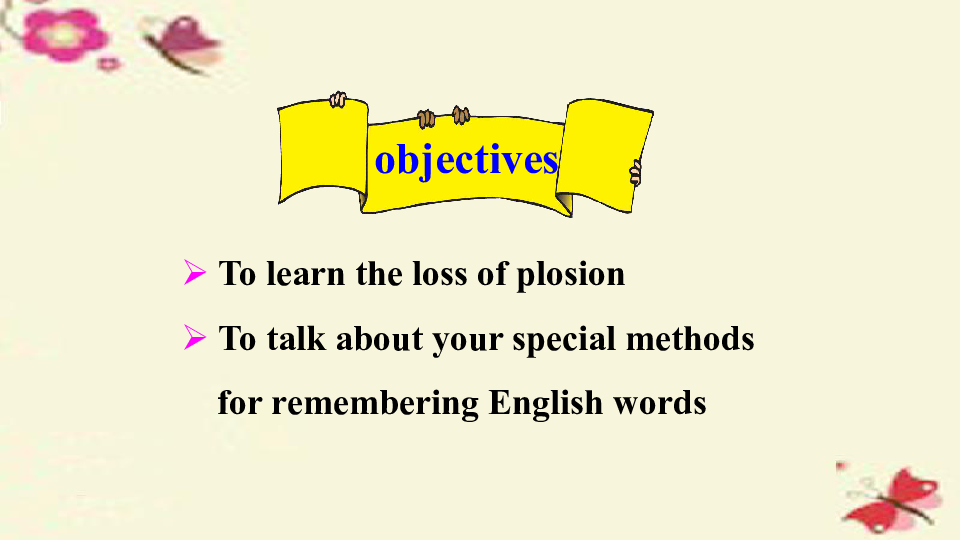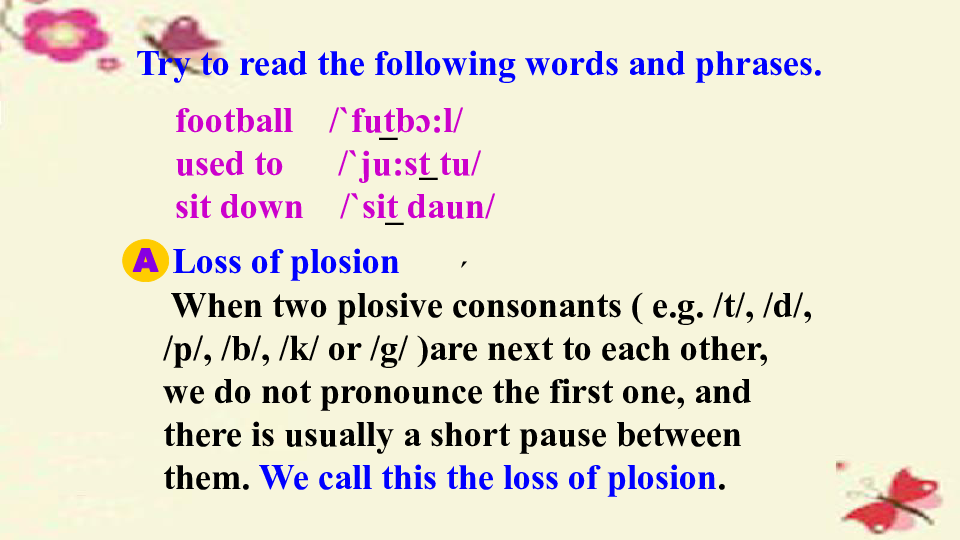广东省深圳市文汇中学八年级英语上册 Module 4 Unit 7 Memory Speaking 课件
文档属性
| 名称 | 广东省深圳市文汇中学八年级英语上册 Module 4 Unit 7 Memory Speaking 课件 |

|
|
| 格式 | zip | ||
| 文件大小 | 315.7KB | ||
| 资源类型 | 教案 | ||
| 版本资源 | 牛津深圳版 | ||
| 科目 | 英语 | ||
| 更新时间 | 2016-12-13 00:00:00 | ||
图片预览





文档简介
课件18张PPT。Speaking Unit 7 MemoryTalk about how to improve your memory.objectives To learn the loss of plosion
To talk about your special methods
for remembering English wordsfootball /`futb?:l/ used to /`ju:st tu/
sit down /`sit daun/ Loss of plosion
When two plosive consonants ( e.g. /t/, /d/, /p/, /b/, /k/ or /g/ )are next to each other,
we do not pronounce the first one, and
there is usually a short pause between
them. We call this the loss of plosion. ___ˊ ATry to read the following words and phrases. except /ik`sept/, what time /w?t taim/,
a good boy /? gud b?i / 爆破音共六个,即: /p/, /b/, /t/, /d/, /k/ 和 /g/。 当一个爆破音后面紧跟着另一个爆破音时,前面的爆破音不发生爆破。
朗读方法是:对于前一个爆破音,只作发音的姿势,刚要发出时,立即发出第二个爆破音。这种现象叫做“失去爆破”。___注意:“失去爆破”现象既可以出现在一个单词中,也可以出现在两个单词之间。A1. Practise saying these words. (P 106)
bi(g) car re(d) pen be(d) time
bla(ck)board Bo(b) Brown
stam(p) book ba(d) day cu(t) down
ge(t) back goo(d)bye pos(t)card
shor(t)-term A2. Read these sentences. (P 106)
1. Gla(d) to meet you.
2. This is a goo(d) boy.
3. That was the bes(t) day of my life!
4. I lef(t) bad about what happened.
5. Mos(t) people like flowers. Work in pairs. Read the words and phrases in A1 and the sentences in A2.
Try to point out each other’s mistakes when reading.Pair workS1: Hello, Simon. Long time no see.
S2: Hello, Joe. Good to see you again.
S1: Have you left school?
S2: Yes. I have had a job for the last two years.
S1: What time do you usually get up at the
weekend?
S2: I usually get up at half past ten at the weekend.
S1: When did you use to get up when you were a
student?
S2: I used to get up at half past seven. I often went
climbing at the weekend.
S1: That sounds great!
S2: Yes, that was the best time of my life!Pair workPractise the dialogue in pairs.Speak upS1: Do you have any special methods for
remembering English words?
S2: Yes. You can make a short sentence
with each letter of the word.
S1: Can you give me an example?
S2: If you want to remember the word
“family”, you can make the sentence
“Father and mother, I love you”.
S1: That’s a good idea. Do you have any special methods for remembering English words? Do they work? BRole-play1. Role play the conversation in groups;
2. Role play the conversation in front of the classLet’s see which group does the best.Useful expressionsI heard you have some special ways of /
methods for… Could you tell me about
them?
What’s your special method for…?
Do you mind telling me about…?
Can you give me an example? / What
about an example?Work in pairs and talk about your special methods for remembering English words. Use the conversation on page 106 as a model.Ways of memorizing English words:1. Imagine a picture
I can imagine a picture “smiles” to
remember the word “smiles”.
2. Act out the word
I can remember “spider” if someone puts
a spider on my hand.3. Organize the words into a group
Apples, oranges and pineapples are
all fruit.
4. Divide a word
We can divide “advantage” into three
parts. “ad” “van” “tage”
5. Add something after or before a word
We can put un-before happy to
remember unhappy.6. Compare two similar words
We can remember “buy” and “by” by
comparison.
7. Pay attention to the voiceless letter
There is a voiceless letter “h” in the
word “hour”, so we should say “an hour”.
8. Pronounce correctly
we can remember there are four syllables
in the word “invitation”.1. Finish the exercises in Learning
English.
2. To preview Writing on Page 107Homework
To talk about your special methods
for remembering English wordsfootball /`futb?:l/ used to /`ju:st tu/
sit down /`sit daun/ Loss of plosion
When two plosive consonants ( e.g. /t/, /d/, /p/, /b/, /k/ or /g/ )are next to each other,
we do not pronounce the first one, and
there is usually a short pause between
them. We call this the loss of plosion. ___ˊ ATry to read the following words and phrases. except /ik`sept/, what time /w?t taim/,
a good boy /? gud b?i / 爆破音共六个,即: /p/, /b/, /t/, /d/, /k/ 和 /g/。 当一个爆破音后面紧跟着另一个爆破音时,前面的爆破音不发生爆破。
朗读方法是:对于前一个爆破音,只作发音的姿势,刚要发出时,立即发出第二个爆破音。这种现象叫做“失去爆破”。___注意:“失去爆破”现象既可以出现在一个单词中,也可以出现在两个单词之间。A1. Practise saying these words. (P 106)
bi(g) car re(d) pen be(d) time
bla(ck)board Bo(b) Brown
stam(p) book ba(d) day cu(t) down
ge(t) back goo(d)bye pos(t)card
shor(t)-term A2. Read these sentences. (P 106)
1. Gla(d) to meet you.
2. This is a goo(d) boy.
3. That was the bes(t) day of my life!
4. I lef(t) bad about what happened.
5. Mos(t) people like flowers. Work in pairs. Read the words and phrases in A1 and the sentences in A2.
Try to point out each other’s mistakes when reading.Pair workS1: Hello, Simon. Long time no see.
S2: Hello, Joe. Good to see you again.
S1: Have you left school?
S2: Yes. I have had a job for the last two years.
S1: What time do you usually get up at the
weekend?
S2: I usually get up at half past ten at the weekend.
S1: When did you use to get up when you were a
student?
S2: I used to get up at half past seven. I often went
climbing at the weekend.
S1: That sounds great!
S2: Yes, that was the best time of my life!Pair workPractise the dialogue in pairs.Speak upS1: Do you have any special methods for
remembering English words?
S2: Yes. You can make a short sentence
with each letter of the word.
S1: Can you give me an example?
S2: If you want to remember the word
“family”, you can make the sentence
“Father and mother, I love you”.
S1: That’s a good idea. Do you have any special methods for remembering English words? Do they work? BRole-play1. Role play the conversation in groups;
2. Role play the conversation in front of the classLet’s see which group does the best.Useful expressionsI heard you have some special ways of /
methods for… Could you tell me about
them?
What’s your special method for…?
Do you mind telling me about…?
Can you give me an example? / What
about an example?Work in pairs and talk about your special methods for remembering English words. Use the conversation on page 106 as a model.Ways of memorizing English words:1. Imagine a picture
I can imagine a picture “smiles” to
remember the word “smiles”.
2. Act out the word
I can remember “spider” if someone puts
a spider on my hand.3. Organize the words into a group
Apples, oranges and pineapples are
all fruit.
4. Divide a word
We can divide “advantage” into three
parts. “ad” “van” “tage”
5. Add something after or before a word
We can put un-before happy to
remember unhappy.6. Compare two similar words
We can remember “buy” and “by” by
comparison.
7. Pay attention to the voiceless letter
There is a voiceless letter “h” in the
word “hour”, so we should say “an hour”.
8. Pronounce correctly
we can remember there are four syllables
in the word “invitation”.1. Finish the exercises in Learning
English.
2. To preview Writing on Page 107Homework
